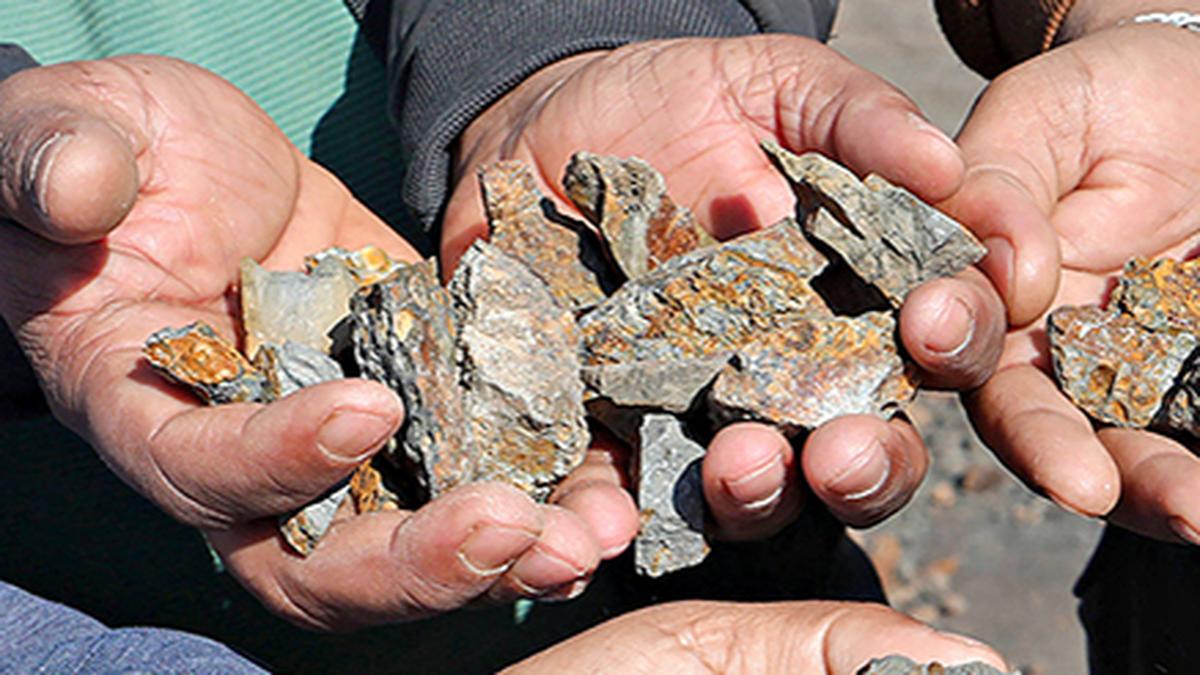Villagers show lithium stones in Reasi district of Jammu and Kashmir in 2023. According to a FICCI-Deloitte report, India lacks the technological capability to extract lithium from such geological formations.
| Photo Credit: PTI
Following the Cabinet approval for a ₹16,300-crore National Critical Mineral Mission (NCMM) in January, the government plans to auction more mines by 2031, Union Minister of State for Mines and Minerals Satish Chandra Dubey said in New Delhi on Friday (February 21, 2025).
Speaking at a meeting organised by the Federation of Indian Chambers of Commerce and Industry (FICCI), he said the government had already auctioned 24 critical mineral blocks domestically. “We aim to auction as many critical mineral blocks as possible by 2031,” he said.
He underlined that public-private partnerships were critical in achieving these objectives. “We must work as complementary partners and as a team to build a self-reliant India,” he stated, urging increased private sector involvement in mineral exploration and extraction activities. The NCMM envisages a separate investment of ₹18,000 crore by public sector units.
While developing new mines are a major focus area, India’s paucity in natural resources means that it has to shore up initiatives to extract valuable minerals from mine waste and reprocess tailings – the residue from crushed ores.
“Tailings contain valuable amounts of critical materials, including copper, manganese, rare-earth elements and titanium, offering potential as a secondary source to enhance supply and mitigate risks from increasing demand, said a report by FICCI and consulting firm Deloitte made public on Friday.
According to the report, India has domestic lithium resources of 12.3 million tonnes; nickel deposits of 189-194 million tonnes; cobalt 45 million tonnes; graphite 211-244 million tonnes; rare-earth elements resources of 230 million tonnes. Given India’s future requirements with increasing demand for electric vehicles and consumer electronics, the report notes that except for graphite, India is almost fully dependent on imports of the rest to meet future demand.
Numerous hurdles
The challenges India face include unavailability of quality reserves of cobalt, niobium, germanium and rhenium. The absence of good quality exploration data results in weak investor interest, with 24 out of the 49 critical mineral blocks remaining unauctioned. India is also grappling with challenges in the economic extraction of critical minerals due to deposits being too deep to viably extract with the available technology.
For instance, the report notes that despite possessing 5.9 million tonnes of lithium resources in Jammu and Kashmir, India lacks the technological capability to extract lithium from such geological formations. Developing mines for critical minerals is a complex process, involving difficulty in land acquisition due to vein deposits often extending beyond lease boundaries, significant resettlement and rehabilitation challenges and long development timelines, it says.
Published – February 21, 2025 09:03 pm IST
